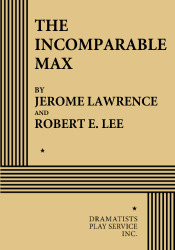
THE STORY: The play begins with the appearance of “the incomparable Max” himself—critic, wit, caricaturist and satirist of matchless brilliance. The action then moves smoothly on to Max’s encounter with Enoch Soames, a down-and-out poet whose arrogance far outstrips his accomplishments. But Soames, convinced of his genius, makes a pact with the devil to discover what posterity will say of him one hundred years hence. His ensuing adventure, which takes him to the eerily computerized reading room of the British Museum in 1997, is funny, touching, and concluded with the kind of masterly ironic twist for which the Beerbohm stories are so justly celebrated. In the second portion of the play, Max meets one A.V. Laider, a young man deeply interested in palmistry, and the glimpses of the future it reputedly can provide. Their casual discussion of the subject turns steadily more gripping—and horrifying—as the action of the play depicts the dreadful moment when Laider, aware that a train is about to be wrecked, lacked the will power to warn his friends of the impending disaster. But again an unexpected final turn of plot saves the situation from tragedy—and ends the play in the same jaunty, delightfully witty manner as it began.
Imaginative in form and wittily sophisticated in content, this fascinating play, based on Sir Max Beerbohm’s “Trips Beyond Reality.” Drawn from two famous and singular short stories, the unique quality of the play is further enhanced by having “the incomparable Max” himself moving brightly in and out of the action.
“It is a pleasure to come upon a truly civilized evening in the theatre…a thoroughly, richly enchanting evening.” —New York Post.
“…a play to talk about, to praise, and to pronounce the most civilized comedy in too long a time.” —Newsday (NY).
